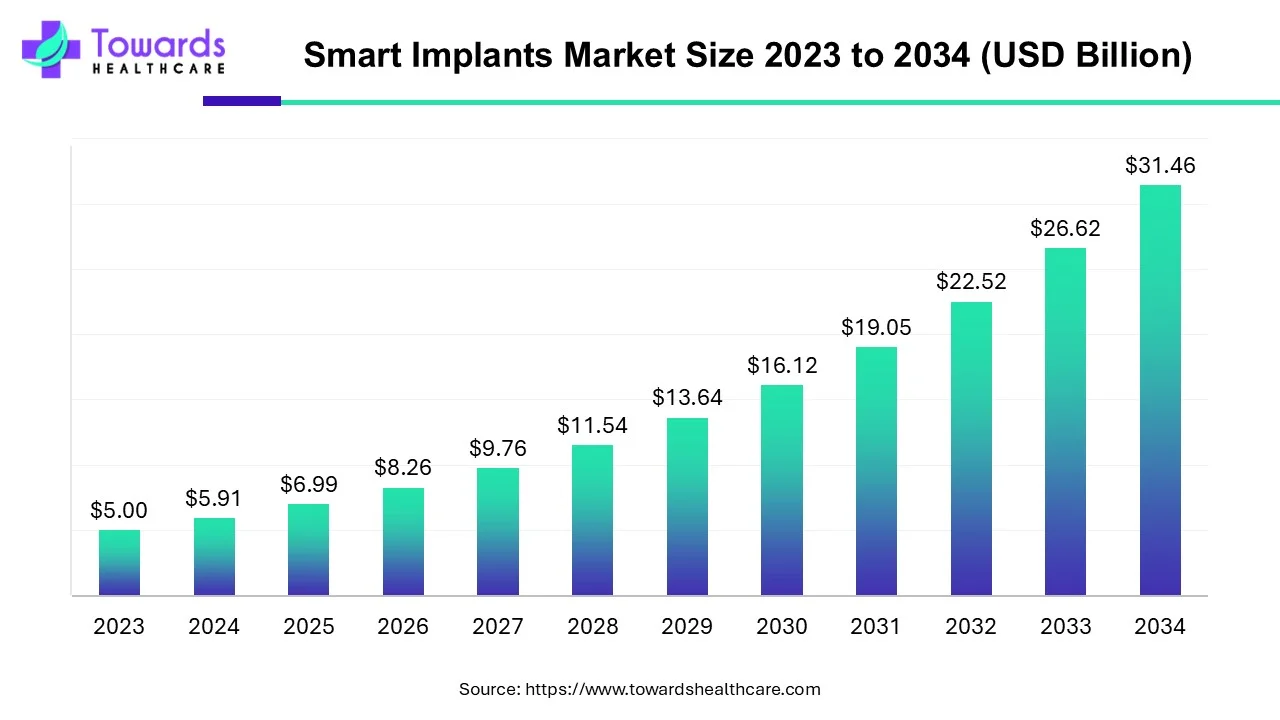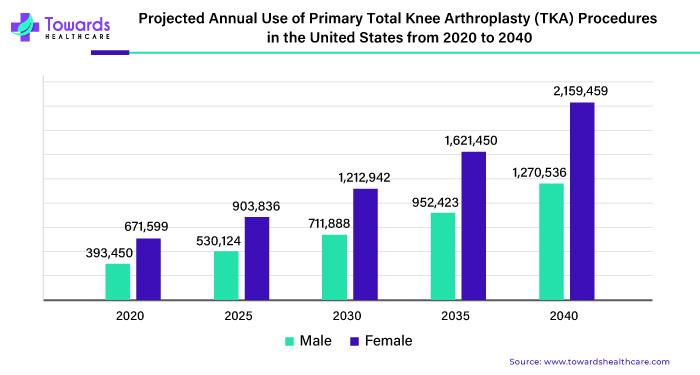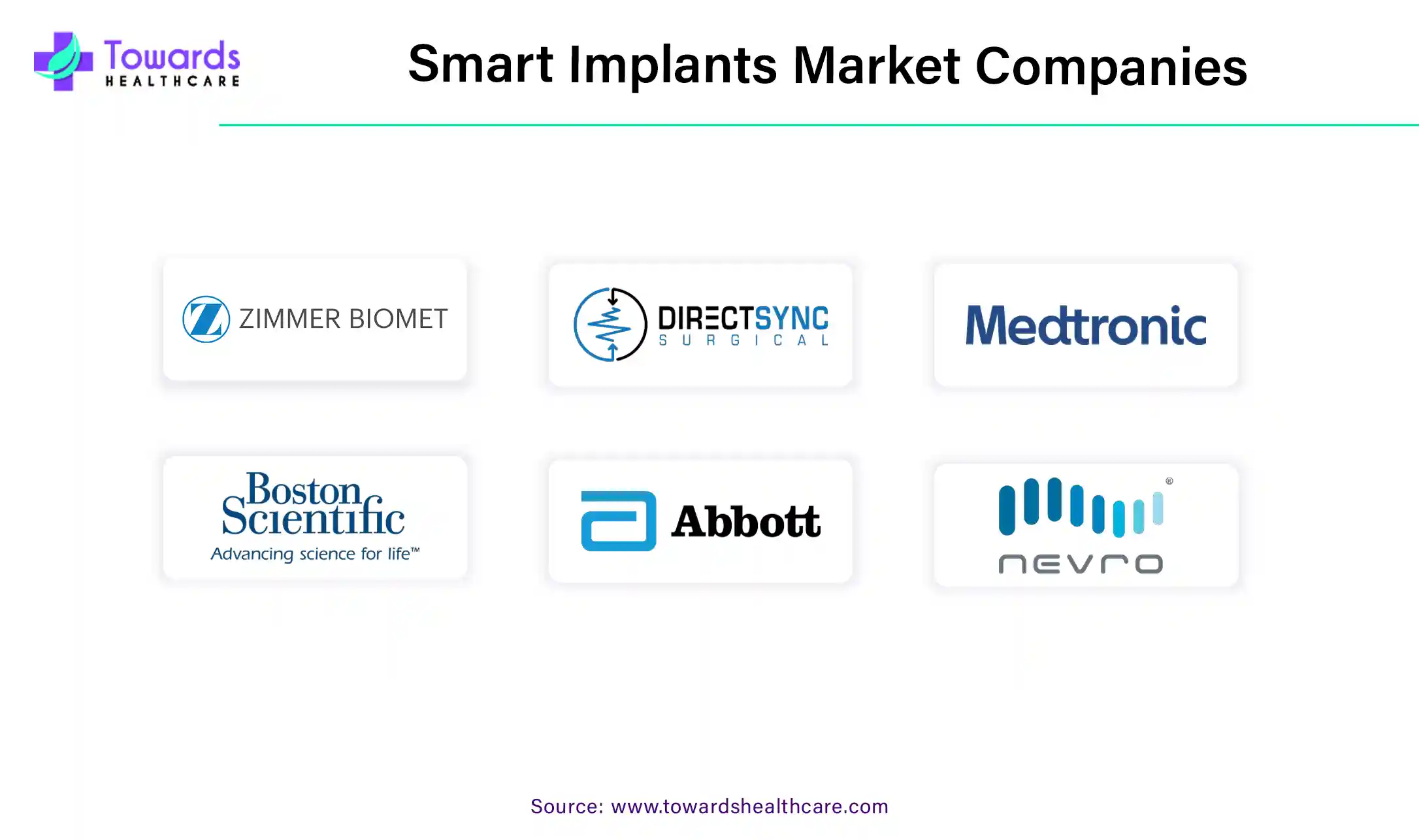December 2025

The smart implants market is set to grow from USD 6.99 billion in 2025 to USD 31.46 billion by 2034, with an expected CAGR of 18.2% over the forecast period from 2025 to 2034. The rising prevalence of chronic disorders, increasing investments, and technological advancements potentiate market growth.

Smart implants are modern medical devices with built-in sensors capable of monitoring, diagnosing and treating various medical conditions. The rise of smart implants marks the start of a fascinating new medical era. These next-generation devices go beyond typical implants by combining sensors, microprocessors and even artificial intelligence (AI), allowing them to interact with the body in real time and provide valuable data to patients and healthcare providers. The devices connect with the body and deliver real-time data to the patient and their healthcare professional. They use sensors, microprocessors and other electronic components to assess pressure, force, strain, stress, displacement, proximity and temperature within the body.
This technology enables medical professionals to make more informed judgments about patient care and treatment by monitoring the implant's health and function. Smart implants serve as a helpful tool to enhance patient experiences after implant surgery since they offer continuous monitoring and assist patients in managing their recovery. Furthermore, smart implants can potentially accelerate the shift to more individualised medical care. However, developing and using these devices involves a variety of technical, safety, regulatory, financial, and privacy difficulties that must be overcome before they can be broadly utilised.
Persona IQ, the World’s First Smart Knee
Zimmer Biomet Holdings, Inc. and Canary Medical disclosed FDA approval of the world’s first smart knee Persona IQ, which combines Zimmer Biomet's successful Persona knee with Canary sensor technology and measures range of motion, steps, speed and other gait data. This data is fed into Zimmer Biomet's mymobility platform, which provides surgeons and patients with crucial post-operative progress information.
Artificial intelligence (AI) and machine learning (ML) algorithms can revolutionize the market. AI-enabled sensors improve the efficiency and accuracy of smart implants. They enable real-time monitoring, providing insights into patient data. This allows healthcare professionals to make effective clinical decisions with reduced errors. Integrating AI in implants leads to more intelligent and biocompatible systems catering to individualized patient needs. AI-enabled implants can analyze large volumes of patient data to predict treatment outcomes and the risk of disease development. They can help identify post-operative complications, allowing for proactive interventions and personalized care plans. Additionally, AI can offer enhanced patient engagement and education by tracking progress, offering reminders, and enabling direct communication with healthcare providers.
The combination of smart implants and real-time monitoring offers a transformational future for healthcare, reducing the boundary between medicine and technology. Imagine a world in which sensors in your body smoothly communicate minute-by-minute data, providing doctors and patients with unique insights into health and wellness. Continuous monitoring allows clinicians to take action proactively, identifying health risks before symptoms appear. Imagine implants that detect early signs of diabetes or forecast heart arrhythmias, saving lives through prompt treatment. This ongoing data stream also powers personalised therapy therapies, which adjust medications to specific needs and reactions. Medication effectiveness and stimulation settings for chronic illnesses such as Parkinson's can be modified in real time to optimise outcomes.
Treating chronic conditions from the comfort of one’s home has become possible with the advent of remote patient monitoring. Smart implants can monitor activity levels and therapeutic adherence, alert doctors about potential issues and enable remote care. This, in turn, ultimately reduces hospital visits for follow-up and enhances the quality of patients’ lives, offering ease of treatment. Continuous monitoring enables the early diagnosis of health concerns before symptoms arise. Imagine implants that detect pre-diabetic blood sugar variations or forecast heart arrhythmias before they become life-threatening. This preemptive strategy could avoid several issues and save lives.
These are only a few possibilities with smart implants. Doctors can easily shift from a one-size-fits-all approach towards personalized care to managing individual patient needs in real time with constant data feeds from smart implants. This level of personalization can transform chronic illness management, enhance treatment outcomes and enable patients to take an active role in their healthcare. However, everything is not perfect. Concerns about data privacy, ethics and accessibility must be handled thoughtfully. We must ensure everyone can access this life-changing technology regardless of economic circumstances. And, of course, we must strike the proper balance between individualized medical data and keeping a healthy relationship with our bodies. The future of personalized medicine with smart implants is overflowing with possibilities, and facing these issues head-on will be critical to realizing its full potential for everyone.
Chronic pain, a secret pandemic that affects millions, could pose a difficult problem for both patients and healthcare practitioners. Traditional means of treatment, including as drugs and physical therapy, can provide comfort, but their effectiveness is generally limited and has adverse effects. In recent years, however, a ray of hope has appeared in the form of smart implants, tiny technological marvels that provide a customised and possibly radical approach to pain management.
One such technology is spinal cord stimulation. This implant delivers mild electrical pulses to the spinal cord, which inhibit pain sensations as they go to the brain. Unlike typical pain medications, which can affect the entire body, smart implants provide customized therapy while limiting unwanted effects. Furthermore, the stimulation intensity can be modified remotely, providing personalized pain relief depending on individual requirements.
Smart implants are small in size and offer various benefits; however, due to their compact nature, they have limited storage space. The small size also presents a problem when it comes to storing data for an extended period. It is essential for researchers to develop alternative solutions to address this issue. One solution is cloud storage.
The area of orthopaedic surgery is transforming, propelled by the development of smart implants that do more than replace joints. These digital technologies are transforming mobility and rehabilitation, offering patients a future of improved function, customized treatment, and proactive health care. The field of orthopaedic smart implants is quickly growing, potentially changing bone and joint health. These outstanding devices, embedded in the body, provide a wealth of real-time data, opening ways for specific therapy, better outcomes, and a more proactive approach to orthopaedic care.

Brain-Computer Interface (BCI) Startup Synchron Tests Mind-Controlled Computing on Humans
Just imagine tools that can read your mind or machines that can be controlled through your thoughts. It might seem like science fiction, but scientists have begun integrating mind and machine through brain-computer interfaces (BCIs). Even though much of the brain is still unknown, BCIs can detect brain signals associated with thought and movement. This method holds considerable promise, especially for those suffering from neurological conditions. However, research has revealed health and ethical concerns, such as those associated with animal experimentation. Watch our most recent film to learn more about the future of BCIs.
Synchron, a brain-computer interface firm sponsored by Jeff Bezos and Bill Gates, is creating technologies to help paralysed people recover control of their lives, published by CNBC in February 2023. Their device, known as the Stentrode, is implanted through blood vessels, allowing users to control technology solely with their minds. Synchron has received FDA approval for early feasibility trials and has implanted the Stentrode in 7 humans. So far, it has been tried on seven patients in the United States and Australia, with encouraging results. While companies like Neuralink are developing comparable technology, Synchron's less invasive technique may make it more accessible and scaleable. The company is conducting an early feasibility trial and aims to go to a critical clinical trials soon, bringing it closer to commercialization.
Smart Magnetic Drug Delivery
What if small, smart implants are placed in your body that continuously check your health and provide precise dosages of medication where needed? This concept of individualized care is becoming more attainable as smart implant technology advances. Physicians could remotely control the release of medication via magnetic fields, assuring accurate and targeted delivery while reducing unwanted effects.
Furthermore, the same MNPs (Magnetic Nanoparticles) may be utilized to track your health state. By sensing changes in temperature, acidity, or other indicators, the implant may send critical information to your doctor, allowing for proactive adjustments to your treatment strategy. This combination of drug administration and real-time monitoring could transform chronic disease care. Consider diabetics receiving exact insulin doses based on real-time blood sugar readings or cancer patients receiving targeted chemotherapy delivered straight to their tumours. The possibilities are endless, and they promise to enhance patient outcomes and quality of life.
Of course, obstacles persist. The long-term safety and biocompatibility of implants must be properly studied. Regulatory difficulties and ethical concerns must also be addressed carefully. However, the potential benefits of smart implants based on MNP technology are apparent, paving the way for a future of personalised, accurate and effective care.
By implant type, the orthopedic implants segment held a dominant presence in the market in 2024. Orthopedic implants are used to replace a bone, joint, or cartilage that has been damaged or deformed. The implant aids in bone fixation and can be used to replace the articulating surfaces in various joints throughout the body. These implants are typically made of titanium alloys and stainless steel and are lined with plastic. The different types of orthopedic implants include screws, plates, and prostheses. The increasing prevalence of orthopedic injuries, combined with technological advancements such as 3D and 4D printing, is augmenting the segment’s growth.
By implant type, the cardiovascular implants segment is predicted to witness significant growth in the market over the forecast period. Cardiovascular implants are widely used to treat cardiovascular conditions affecting the heart and blood vessels. The different types of cardiovascular implants include pacemakers, implantable cardioverter-defibrillators (ICDs), biventricular pacemakers, and cardiac loop recorders. These implants also facilitate remote monitoring of the patient’s heart condition. These devices can help control irregular heartbeats and support the heart’s pumping function.
By application, the orthopedic segment led the global market in 2024. The rising prevalence of orthopedic disorders due to accidents, wear & tear, or sports injuries. According to the United Nations, 93% of the world’s fatalities on the roads occur in low- and middle-income countries. This leads to an increasing number of hip and knee replacements, potentiating the demand for orthopedic implants. It is estimated that approximately 3.6 million knee replacements will be performed globally in 2023.
By application, the cardiovascular segment is anticipated to show lucrative growth in the market over the coming years. The rising prevalence of cardiovascular disorders increases the demand for cardiovascular implants. More than half a billion people in the world are affected by cardiovascular diseases. Smart implants allow caregivers to remotely access information about the physiological conditions of the patients and predict outcomes.
By surgery, the open surgery segment held the largest share of the market in 2024. Open surgery has been the most conventional approach to surgery for many years. This type of surgery has been found to have better results and can be easily performed using minimal equipment. Hence, it eliminates the risk of infection to other organs. Open surgeries are effective for complex procedures and result in better visibility.
By surgery, the minimally invasive segment is anticipated to grow at the highest CAGR in the market during the studied period. The use of small tubes, tiny cameras, and specialized surgical tools enables surgeons to perform minimally invasive surgeries. Minimally invasive surgery offers superior benefits over open surgery. It leads to smaller cuts, less pain, and faster recovery. This allows patients to stay in the hospital for a shorter period. It also has reduced scarring on the site of surgery. All these benefits increase the demand for minimally invasive surgery.
By end-use, the hospitals segment held the major share of the market in 2024. The segmental growth is attributed to the increasing number of surgeries, suitable capital investment, and favorable infrastructure. Hospitals provide multi-disciplinary expertise to the patient. Smart implants revolutionize the workflow in a hospital by monitoring patient health, tracking recovery, and guiding treatment in real time. The growing demand for real-time patient monitoring fuels the segment’s growth. This helps healthcare professionals to provide personalized care.
By end-use, the specialty clinics segment is expected to grow at the fastest rate in the market during the forecast period. The presence of skilled professionals and the availability of specialized equipment foster market growth. Many people prefer specialty clinics as they provide personalized treatment and detect the risk of disease earlier. The increasing number of specialty clinics also contributes to the segment’s growth. It is estimated that there are more than 160,000 dental clinics in the U.S.
North America dominated the global smart implants market in 2024. Advanced healthcare infrastructure and the presence of key players drive the market. Favorable government policies and regulatory frameworks support the development of smart implants. The Food and Drug Administration (FDA) and Health Canada regulate the approval of smart implants in the U.S. and Canada, respectively. Advanced healthcare infrastructure and state-of-the-art research and development facilities contribute to market growth. The increasing prevalence of severe chronic disorders potentiates the use of smart implants. Cardiovascular disorders are the most common disorder in the U.S., resulting in one person dying every 33 seconds.
Asia-Pacific is anticipated to grow at the fastest rate in the market during the forecast period. The rising prevalence of chronic disorders and the increasing adoption of advanced technologies promote the market. The growing research and development activities and favorable government policies promote the development of smart implants. Countries like China, India, and Japan are at the forefront of developing and manufacturing smart implants in Asia-Pacific. The increasing investments, collaborations, and mergers & acquisitions boost the market. The Japanese government announced an investment of $65 billion in microchips and AI to address the aging population. The funding will be used to build domestic chip production, attracting foreign investment and leveraging AI for productivity gains.
Europe is expected to grow at a considerable rate in the smart implants market in the upcoming period. Favorable government support and the growing research and development activities govern the development and use of smart implants. The increasing number of clinical trials and rapidly expanding healthcare infrastructure augments market growth. The rising awareness about advanced technologies for effective treatment and increasing healthcare expenditure also contributes to market growth.
UK Market Trends
The UK government announced the launch of the “Innovative Devices Access Pathway” (IDAP), a pilot scheme to improve access to innovative and transformative medical devices and meet unmet patient needs. In 2023, approximately £292 billion was spent on healthcare in the UK.
Dr. Bill Hunter, CEO of Canary Medical, commented on the receipt of the FDA approval for its Canturio lumbar cartridge, that it is the company’s first spine offering and the company’s first FDA breakthrough designation outside of the large joint space. The implant was developed for lumbar spinal fusion patients and the company aims to secure an innovative spine partner for marketing the product.

By Implant Type
By Application
By Surgery
By End User
By Region
December 2025
October 2025
November 2025
November 2025